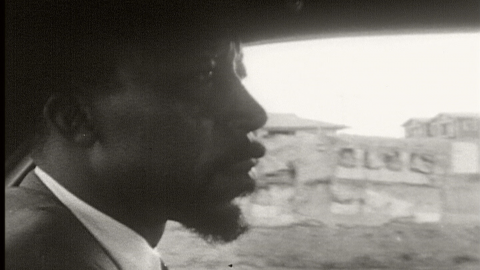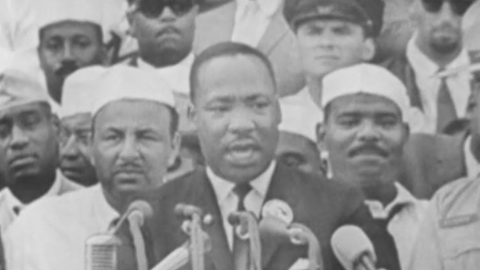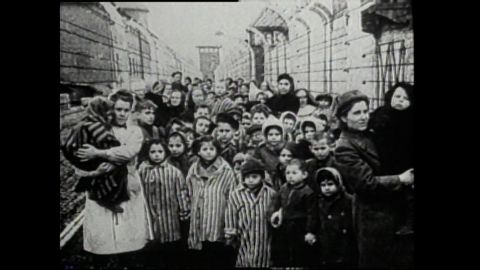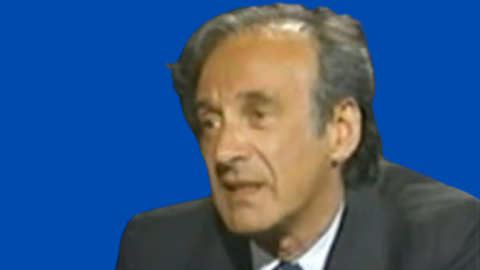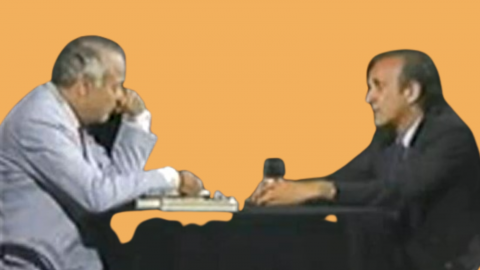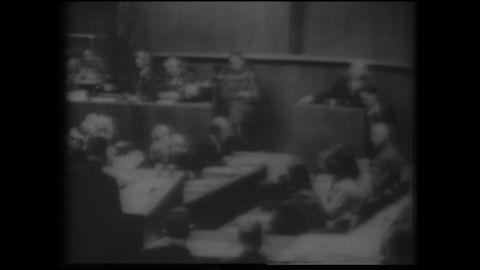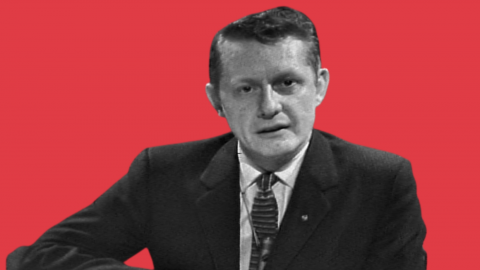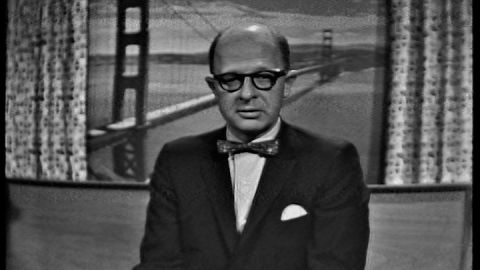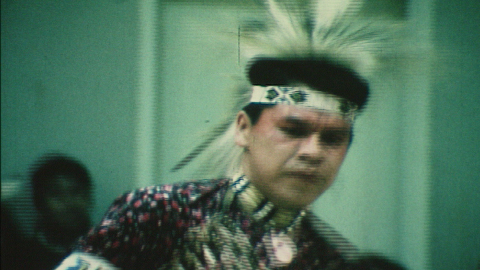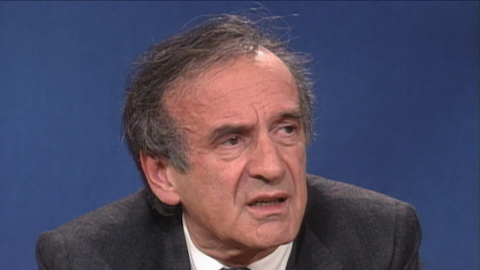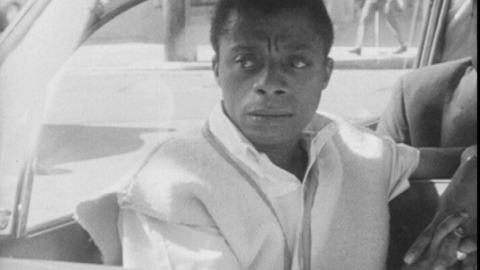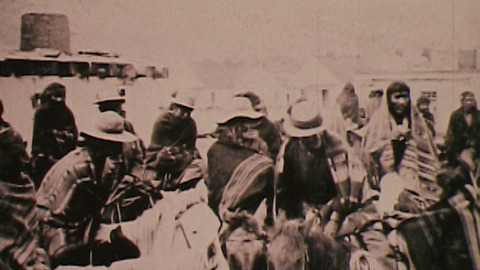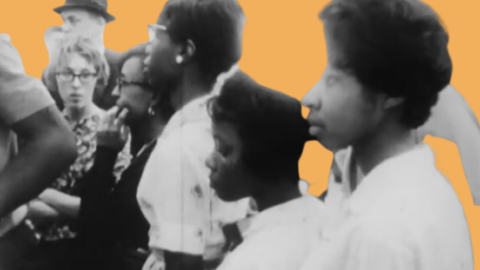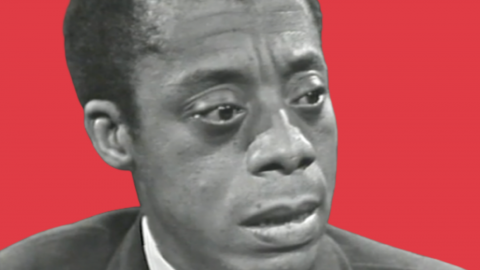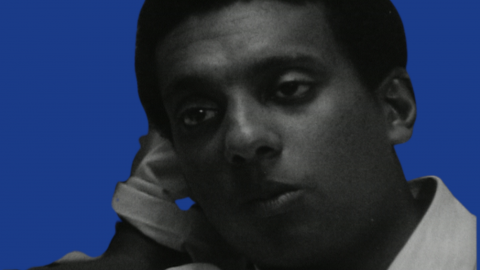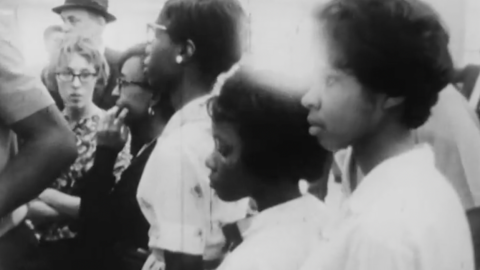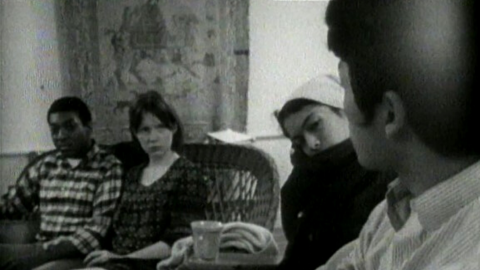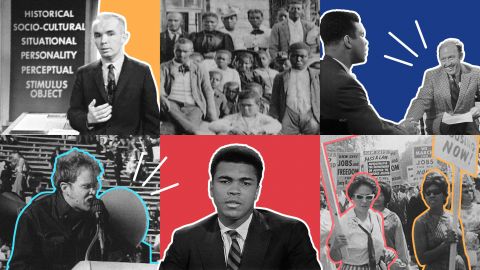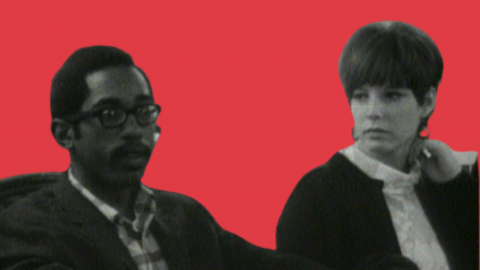[upbeat music]
- [Announcer] The following program
is from NET.
The public television network.
- [Narrator] Last month, NET invited a group
of 11 people, blacks and Jews,
to take part in an experimental dialogue
on relations between the two groups.
Relations which recently have been the subject
of much attention in the national press.
They were told they could take as much time as needed
to try to get past the rhetoric and fears
that have divided them.
To try to reach some understanding of each other.
They spent 11 straight hours together
before our cameras in Washington,
with only short breaks between each of four sessions.
The next two hours is an edited version
of what took place there.
Helping run the dialogue are Charles C Shaw
and P Bertand Philips,
psychologists with the National Training
Laboratories Institute,
of the National Educational Association.
Participating are Paul Jacobs,
political activist and writer from San Francisco.
John Hatchett, teacher and central figure
in a black Jewish controversy at New York University.
Charlotte Robinson, teacher in an at high poverty program
in Grand Rapids, Michigan.
Lou Smith, president of Los Angeles' Operation Bootstrap.
Naomi Mandelbalm, a teacher from a Detroit suburb.
Sid Finley, Chicago field representative for the NAACP.
Ed Solomon, principal of a Harlem junior high school.
Lorrie Rodell of New York's Urban Coalition.
Dick Cohen, associate director
of the American Jewish Congress.
Murray Saltzman, an Indianapolis rabbi,
active in civil rights.
And Milton Hoffman,
merchant in Washington's black community,
whose store has been burned down twice.
NET Journal presents
"Some of My Best Friends."
- Perhaps I, as my last measure a poet,
in the first measure a merchant,
in another measure a member of the populace,
in another measure, a citizen of Washington,
and in another measure, just one human being
amongst other human beings.
I'm best qualified to start this.
And for that purpose, I'd like to read a poem
that I have before me,
that I'm sorry I found the cause
and the necessity for writing.
It was written on April the sixth of last year,
shortly after the assassination
of the Reverend Martin Luther King.
It was written at the site of my former
and present business.
At the corner of ninth and eighth street, north east.
It was written looking at the cinders that were there,
instead of the merchandise and the fixtures
that had been there the day before.
Merchandise and fixtures which I felt
had been honestly used to serve the community,
as well as myself.
If I may have the privilege, I'd like to read it.
And I'd also like to read the comment
that is below it.
It is called "From the Cinders."
Cinders black, relating to my neighbors.
And rain won't fall in any color tonight.
Though some accept this as expiation for slavers,
and some believe that this wrong makes a right.
Are blacks less blind than whites?
Who engage in actions.
Blindly dealing blows, where sense suggests.
Here are friends who did befriend the doer.
Here is one so different from the rest.
How shall peace come
where there are two humans?
Do you not understand that God's command
decrees that each must be a better human
if both are aired to reach the promised land.
Pray God that there shall come just one tomorrow.
That men shall see through eyes both blue and brown.
That not contributes more to human sorrow
than forgetfulness.
That every child's God's own.
And underneath that are the words,
"Composed Saturday, April the sixth,
"one day after viewing the burned hulk
"of what once had been Art Young's Menswear.
"And respectfully dedicated to all our friends
"and neighbors.
"And to the memory of a great and noble man.
"May he rest in peace.
"To the Reverend Martin Luther King."
I hope that this requires no comment on my part.
- I think it requires a lot of comment on your part.
It doesn't, to me, say anything,
as much as it raises a lot of questions about
what you really felt.
I'm not a merchant, but if I had a store
that had been burnt out, presumably,
and destroyed with all your merchandise
and the other things that you mentioned
had been destroyed in that fire
after serving the community and yourself, as you put it,
all these years,
at least from my own point of view,
I wouldn't have sat down and written a poem.
I think I would have madder than hell.
And would not have been satisfied,
from my own point of view, with writing a poem which
seems to be some kind of a cop out.
It's a cop out, because you're apparently
ashamed to be mad.
Because something inside you felt
that you shouldn't really be mad.
I think the poem expresses a very,
to me, again, a very artificial kind of emotion.
It says, "They burnt my store,
"they destroyed what may have been thousands of dollars
"of life savings and so on,
"so I'll write a poem
"and say we should all love each other."
- Maybe I better answer this question first, please.
- I'd like to hear the answer to that one.
- In the store with which I am associated,
Art Young's of ninth and eighth street, north east.
Because we recognize that 99% of our patronry
is from people who are brown or black or tan,
and I try not to put too much emphasis on color,
because to me, character is of a little more importance.
We employ only members of your race.
We don't employ any white people.
- [Man] Which race do I belong to?
- The human race.
[group groans]
- That isn't the context in which you meant that.
- [Milton] I did.
- Now be honest. - [Milton] I did mean that.
- No, he's right, be honest, for crying out loud!
When you said "Your race,"
you meant a black man, a Negro, a mulatto,
whatever the hell he is.
Don't say "Human race." That's what I mean by a cop out.
You're not honest with yourself!
- Mr Solomon...
- I'm Mr Solomon. - He's Mr Solomon.
- Oh, I'm sorry.
- I'm Jacobs. I'm Jacobs, he's Mr Solomon.
- I won't remember anyway.
The pride of authorship,
we're sensitive to, I'm sure.
But what you were doing was, in a certain sense,
posturing.
Creating and rationalizing feelings
with a sense of guilt, it seemed, already.
Inherent in trying to justify yourself,
perhaps as a Jew, but as a person with a point of view
that you're going to accept everyone here.
I'm not sure I'm going to accept everyone here.
And it's not the issue of posturing
or reading statements or poems.
But you know, coming to grips with
what are we really saying to each other?
And what do we really feel about each other
within our own selves?
This is the issue.
- Also, you know, I didn't really come here
to talk about Martin Luther King.
I came here to talk about Jews and blacks.
- If we can get down to what person's turned.
The nitty gritty of the situation.
But I think that, perhaps some sort
of historical perspective is needed.
Now, I'm perfectly willing to discuss
black Jewish relationships, but on my own terms.
And my terms are these.
That first of all,
you have to recognize that my ancestors
were brought here, not as persons.
Let's get that straight.
Were brought here as animals, as beasts of burden.
So that euphemism "Slavery" does not apply to us.
Now it has taken us almost 400 years
of our own striving,
not with anybody else's help,
our own striving to try and become
what this country said we were not.
Namely, human.
In the process,
from so-called slavery, through reconstruction,
through the World War I, through World War II,
down to the present,
certain persons, like myself,
have decided that we have to have some sort of roots.
And that the most important thing
to root ourselves in is our own blackness.
Our identity as persons of supreme worth.
Now, obviously, in the process,
a lot of people are going to get hurt.
That is both verbally and physically.
- Why?
- Very simply.
We were spawn in a country that was founded on violence.
We were not special creatures.
We were not immune to that kind of violence.
So why, all of a sudden,
when blacks resort, as some people say they do,
to violence, why the surprise?
Because we're no longer docile beings?
- Mr Hatchett, we were prepared to jump on
Mr Hoffman because [indistinct].
Isn't the kind of general [indistinct].
You know the country was founded on violence.
Unquestionably, there is an element of violence
that was intrinsic and indigenous
[indistinct].
One based on a concept of violence?
If violence is finally the absolute alternative
available in America, and nothing else,
then this is a waste of time.
- But John I thought was gonna start talking about Jews?
[indistinct cross talk]
- It isn't really a waste of time
because you could join me in it.
See, I feel so trapped in all this bull [bleep]
that goes around, saying "Violence ain't the way."
You know.
And I'll give you examples of that.
The Black Panthers in Los Angeles were trying to buy guns.
And let's bring it to the Jewish community.
And they were appealing to Jewish liberals
for money to buy guns.
Okay?
And they were told, "Oh my God,
"you don't do those kind of things."
But those same people packed Hollywood Bowl
and bought guns for Israel.
So I feel kind of like, you know,
there's a separate standard set up for me over here,
that no other American has to go through.
[indistinct cross talk]
- He's absolutely indiscriminate about who's his ancestor.
- That's why I said you should get your gun and join me.
[indistinct cross talk]
- Are you differentiating, in your own mind, honestly,
between a Jew and a white?
In other words, when you say,
"Johnny Jones is a bigot."
All right.
Now when you say,
"Sidney Goldberg is a bigot."
Do you honestly make any differentiation?
Is it important to you that he's Jewish too?
Must the accolation be put on?
- The only differentiation I make between them
is that he's a bigot, and I hope to God that I'm not.
That's the differentiation I make.
- But you say the two are the same in your mind?
- Most certainly, most certainly.
- All right.
If by the way, we all agree to that,
I mean, if I ask each.
Lou?
If I ask you the same question?
- If you were to ask me the same question many years ago,
no.
I'll give you an example.
I grew up in a west Philadelphia ghetto.
You see.
And I had my own image of a Jew.
About as a teenager and pre-teenage.
- That's what I said earlier, remember? Okay.
- And I had my own stereotype of a Jew.
He owned a store, he was a hustler,
and I tried to hustle him,
and he wasn't just a white man.
He was a Jew.
- Why?
'Cause you know no other.
You know no other, your context was no other, I'm sorry.
- If you will let me finish telling you
how I feel about it before you tell me,
you know, how I should feel about it.
- He's right.
- And I knew he was a Jew
because he was closed on Jewish holidays, you know.
I knew he was a Jew and a white man on top of it,
because his kids didn't go to my school.
We went to [indistinct] Washington which was all black.
And even though he lived in our community,
he went over to Blankenburg and Lighty high schools.
I knew he was a Jew.
You know, somehow you just get your information.
And to me, that was all a Jew could be.
In my world, there were no other Jews.
Since then, I could say now, I don't care what he is.
I don't question that about him.
I may kid, you know, with Paul sometimes.
Are you Jewish, Paul?
- I'm half Jewish.
My parents were Jewish, but I'm not.
- But I'll say this, as a kid,
in my ghetto, and in my gang world,
damn right, I had a stereotype of a Jew.
- But now, I'm asking you.
In other words, when you discuss it now.
- I know, I said when I discuss it now,
it doesn't mean anything to me.
- You asked why Jews...
Now, I think it's wrong when a black guy gets attacked
for saying...
When a black guy is accused of being anti-Semitic
because he says "The school system of New York City
"is run by Jews."
I think that's a fact.
The school system of New York City
is being run by Jews.
What becomes anti-Semitic though
is when you go one step further than that
and you say, "The reason that he is doing this
"is because it's part of a Jewish plot."
- Can you say what you suggested?
Al Van didn't.
Les Campbell didn't.
And we are the three persons thus far,
by no means alone, but thus far,
in New York City, who have been,
I've sort of faded into the background.
Now Les Campbell and Al Van are getting the brunt
of what I have come to call a very vicious
and very unprecedented attack.
And the things that we have in common,
that is Al, Les and myself,
is a compassion for the welfare of black youth.
Now,
despite our particular idiosyncrasies,
we do not allow that compassion,
or we have not allowed that compassion
to turn into a passion against Jews.
- It sounds like it. - Hold on.
[indistinct cross talk]
- This is what Jews have said,
and have tried to convince people of.
Your organization, for instance.
Leveled an attack that I have not witnessed,
in part to raise funds.
This is one of your functions.
To excite the Jewish community
to the presence, just a minute.
- I'll tell you-
- [John] The presence of so-called black anti, you know.
- John, I think we owe each other at least this.
I don't have a right to interpret what you say,
although I do have a right to tell you
what kind of an effect it has on me.
I hope you'll grant me that.
Now, you don't have any right to interpret
what we do, except in terms of how it appears to you.
- Oh yes, I do.
- Now if you say, we're exciting the Jewish community
to raise funds, that's ridiculous.
- Why is it ridiculous?
- Because it isn't true, and because it betrays
a lack of understanding on your part
that's very discouraging.
- Point out to me that the basis for the attacks
on the black male teachers
in the New York public school system...
- When you say that Jewish teachers
are trying to castrate black children.
- [John] Mentally castrate.
- Well, okay, mentally castrate,
and when you make it very clear,
at least as we interpret it,
that it's part of a Jewish conspiracy
to keep the black kids down.
- Who used the word conspiracy? That's your interpretation.
- You have said that it's done on purpose.
- I have never used the term.
- Ralph Pointer said it.
- Oh, Ralph Pointer.
- Okay, and Van and Campbell too.
- They have never used the term conspiracy.
- Now let's talk about what's really happening.
What's really happening?
When I see examples,
and I'm sorry, I have it in the motel room.
I could have shown you examples of the reactions
of children today, black children...
For instance.
In the first week I was in a school, as a principal,
there was a trespasser picked up.
Now, when you pick up a trespasser,
the law requires, and this was a boy not in the school,
a boy who had 17 previous arrests.
The father came in the next day.
Now, I'm brand new here.
He opened the door of my office and said,
"You white Jew bastard principal.
"Hitler didn't burn enough of you."
Now, why was I a Jew bastard principal?
You see, I was a white principal.
- [Man] Because you're not Italian.
- He didn't even know my name
and let me tell you what's happening.
That the teachers in New York City,
since we have constantly done this,
we say "The New York City school system
"is Jewish, Jewish, Jewish."
Now, you use it because it's emotional.
You don't have to reason,
you don't have to be rational.
Why, you can say "You lousy Jew bastard,"
and right away, you got something
to go at this individual with.
I'm a Jew.
You say.
Whether Paul says he's Jewish or not,
he's stuck with that, you bet your life.
- I'm Jewish, I'm Jewish, I'm Jewish, I'm Jewish.
I'm proud I'm Jewish.
- [Man] Welcome back to the fold.
- I can understand that happening,
since every teacher I ever knew,
every teacher I ever had,
you know, from first grade through high school.
Every teacher.
You know, every official teacher
was Jewish.
And one makes an assumption that all teachers are Jews.
And the mass of black people in the ghettos of the north
never run across any other kinds of Jews.
And for someone who's in the educational system,
you know, to be surprised and that was, like-
- I'm not surprised, I made a statement.
- That's 20 years ago, you know.
- I wanna ask you something. Can I ask you something?
- We were calling teachers lousy Jew bastards
15, 20 years ago.
We were calling a pawnbroker a cheap bastard
when he didn't give us enough for the record player
that we had to pawn to pay that cat for the rent.
You know, that we didn't get
because the case worker, who was Jewish,
you know, didn't come through with the bread.
- Now, I'm gonna say this.
You see, now this is anti-Semitic
if you interpret that to be so,
then maybe we can get to what's wrong with this.
I maintain that there has been a deliberate plot
within this country to keep black kids dumb,
ignorant and uneducated.
We have some ideas about how to teach, you see.
See, we take the drop outs,
the drop outs of the school system,
and make computer programmers out of them in one year.
But no, you won't come to Los Angeles
and find that in the schools,
because we have not yet been able
to muster the power to take those schools over.
- But you have not answered this problem of why
everyone who is bad is suddenly a Jew.
- I don't know anything about that problem.
You better work that out with New York people.
- No, that's true in Detroit.
- [Charlotte] Nobody has made a generalization
that everybody who is bad is a Jew.
- Well, this is so in Detroit too.
In a Detroit ghetto, the world Jew
seems to be used if it's a bad landlord,
ipso facto, it's the Jew landlord.
In fact, if they don't like a black man,
they called him the Jew black, or the black Jew.
- I think a lot of that has to do with the resistance
of that first line I was talking about.
[indistinct cross talk]
- [Man] Indianapolis too next, if I may.
- The point is, the dealings in the Midwest,
if you wanna call it Detroit then.
I'm from Grand Rapids.
The dealings that most black people have
in a community with a Jew
is in the capacity of a boss.
He is the one who has the money,
who runs the store.
He is the person who is usually,
usually the ghetto landlord.
- Yeah, I'd like to make a couple of points with respect.
Since I'm from the Midwest, Indianapolis too.
In the Midwest, generally speaking,
the population of the Jewish community
is less than one percent.
I think you can speak of Jewish power
in New York, and Los Angeles.
- But you can't in the Midwest.
- No, you can't.
Chicago, I guess.
But Indianapolis, we're less than one percent.
There really isn't a great deal of power.
- And that's strategic, I take it?
- Not strategic, no.
Today, the Jews are concentrated
largely in professions.
They're not in the stores.
The stores have been taken over by large chains.
The Jew is moving and has moved out
of the retail business rapidly.
There are Jewish merchants
and there are Jewish landlords in the slums.
But the largest slumlords are Indiana University,
the Indiana National Bank.
You know, major white protestant institutions.
And yet, in Indianapolis,
the epithet "Jew merchant" is used
not by blacks, but by a particular group of blacks.
By and large, the relationship between
the black and Jewish community is very good.
- [Man] The real envy is cultural language.
- But the point I'm trying to make is,
it's this identification of the oppressor and the Jew
that begins to, I think,
tear apart the Jew and the black community.
- I was right.
We're not about to end the issue.
We had two things before us.
One was some clarity about where we were
on the issue.
And I don't think we need any encouragement
to get going on that one.
The second is what's happening to us here, in this group.
We haven't gotten for ourselves clear on
what the concerns are,
in a way that we can deal with them.
Why don't we take 15 and come back
and see how we go the second round.
[indistinct chattering]
- I'd like to ask a question.
Before we get into something else.
And I've never been quite clear on it.
I'd like to hear from
a Jew
what he considers
as anti-Semitism.
His definition of anti-Semitism.
- Anti-Semitism is racism.
The irrational thrust.
Why do you place the term Jew in front of anything?
Anti-Semitism comes out of the Christ killer idea.
Now, what you're doing is simply saying,
"Well, I got some other handle
"that I can bang this guy over the head with."
And so what I'm doing is,
he may be an exploiter,
he may be a poet, teacher,
he may be a crummy doctor.
He may be all these things.
But the irrational thrust.
How do I answer the fact that I am a lousy Jew dash?
What do I do with the word Jew?
And it's racism.
And you cannot blunt it with any other thing.
Why get into any discussion about
the reason that I as a Jew?
No, I as a person am against it,
because it only gives the next guy the chance
to be racist about the black, the Indian,
the Mexican, et cetera and so forth.
- Point of information, I gotta ask, you know,
just question.
You don't want to be referred to as a Jew?
- Not if it's an irrational mark.
If you say, "His religion is..."
Fine.
But if it comes up, in other words,
I don't want you to say "Well, he's a Jew principal."
I object to it.
What's it got to do with the price of fish?
- I don't agree.
It shows you, you know, we all
have another notion about it.
And what I find, as a radical,
horrendous about anti-Semitism
is that it seems to me to be a reflection
of black people picking up the worst aspects
of the white society that I abhor.
Now that's why I don't accept the notion
that what you have to do
if a black militant organization,
or it doesn't even have to be a militant organization,
publishes an anti-Semitic poem.
Or a poem which is conceived of
with some legitimacy as being anti-Semitic,
I think there's only one thing to do, Dick,
and that's not to take ads in the New York Times.
It's not to publish these kind of things.
It's to get down, right down here,
with this guy, and say
"Look, I'm not the enemy,
"because I happened to be labeled as a Jew.
"The enemy's out there, out there,
"all the God damn miserable society we're both trapped in."
But what's happened has been,
is that now, because of the political situation,
the anti-Semitic question has come back on the agenda,
and all Jews, in my belief, in America,
all Jews,
are somehow deep in their consciousness,
they really believe that they're on
a temporary leave of absence from a Pogrom.
- I have the impression,
I have the impression that Negroes think the Jews
are hung up on anti-Semitism.
Too much. Is that your feeling?
- This is the hysteria that I read in the press
and elsewhere, that all of a sudden,
black, you know, in quotation marks,
black anti-Semitism is on the rise
in the black community,
is becoming virulent, is poisoning the system.
You know, it's poisoning the body politick
of the country, and it has to be stopped at all costs.
I really don't understand this.
We maybe...
I will grant that we maybe,
to a certain extent, anti-Jewish,
vis-a-vis Jews in the United States of America,
and more precisely, vis-a-vis Jews
that we come in contact with in our day to day activities.
But to say that we are anti-Semitic,
and condemn an entire group on the basis
of their religion,
this is the sheerest
and the most denigrating kind of fabrication
that I have ever encountered.
If I say nothing else at all today,
I want to say that.
- But John, that's really not so much the issue.
Because the real problem is,
not to describe the phenomenon,
which I think you describe accurately,
and which I don't disagree with,
with your description.
The real problem is,
what do people who are in positions of leadership do?
Vis-a-vis their own communities
in this kind of a situation?
One of the tasks of leadership
is to explain.
Yes, it's true.
We people who live in the ghettos
have to deal with Jewish slumlords
and Jewish [indistinct] who steal from us in the store,
and the credit and all the rest of it.
But they're not the only ones.
- You're saying what he said to you.
He's saying "Don't stereotype me."
- No, I'm saying more than that.
I'm saying he's got a responsibility.
- [Man] Okay, so let's go on from there.
Okay, you're both saying "Don't stereotype us."
- These are not the only people
that these people are meeting.
I do not belong to one organization-
- Who are these people?
- Well, the pawnbroker.
- No, you said "These are not the only people
"these people are meeting."
Who are "These people?"
- The black people in the ghetto.
Because I do not today belong
to one organization in Detroit.
Whether it's congress, [indistinct],
National Council of Jewish Women.
Who have not got, at my temple,
groups of women working in the inner city.
And one of the things I must admit.
You talk about criticism.
Well, there's positive criticism.
- I think what you better do
is check the level of inner city that you're talking about.
Because that's another phrase [indistinct].
- All right, I am talking about schools
in the Detroit inner city,
where there are many, many women.
Jewish women who are working on a personal basis,
a one to one basis, with children.
I know that some of my own Jewish students
who are working on inter-racial committees.
In other words, I do not agree at all
that the only Jew that you see in the inner city
is the pawn broker and the shop keeper,
who very often, is not even Jewish.
There are other people working in there
and I haven't heard one word about these people.
- When I was a kid.
I'm telling you the truth, I wouldn't lie to you.
- But you know these people now, what do you mean?
[indistinct cross talk]
- No, I want her to understand one thing, and that's all.
Just one thing.
That the agencies those people are working in,
are the agencies that are hated by the inner city people.
You see, that's the very thing that Paul wrote about
in his book, "Prelude to Riot."
And we make this great big mistake
of thinking that we trot our little
hinepots' down to Watts. - Not me.
- And we sit in inner city Detroit, et cetera.
And we sit in these little agencies,
and those agencies are hated by the black people
on the street to begin with,
which complicates your problem, you see.
- Even if you were loved, the numbers involved
can't possibly off set the years and years
and years and years,
and constant involvement with landlords,
and pawn brokers, and shop keepers,
and social workers, and case workers.
And all them other mothers.
- I want to
get at certain facts.
One, instead of,
the use of the term anti-Semitism.
Let's assume that we are in a semantic,
and good Lord,
forgive me, hang up.
And we have this problem for it.
We have this problem of the use of the term anti-Semitism.
Maybe it's a wrong term.
Does it still make the anti-Jewishness
any better or worse?
Because John said,
"We are not anti-Semitic, we are anti-Jewish."
And I think, here in lies the telling point.
I'd like to know, what do you mean,
you're anti-Jewish?
- He's pro-Arab. - Wait, no, I'd like that.
[indistinct cross talk]
- Ask every one of us here, [indistinct].
Whether or not we're anti-Semitic or anti-Jewish.
And all of us will tell you, unquestionably,
we are not.
- Not what? - Not what?
- Not anti-Semitic or anti-Jewish.
And I venture to say that. I stick my neck out this far.
But I say take a poll right now.
- No, I asked John, he made the statement.
I didn't ask you.
- He said he was anti-Jewish.
- He said he was anti-Jewish.
- He did not.
He did not say this!
- That's what I gathered.
If he didn't say it, then I withdraw that statement.
- Let's ask him, do you consider yourself...
John, do you consider yourself to be anti-Jewish?
- He didn't say "He."
- I'm asking about him. - Let him answer it.
- No. - No, okay.
- Communication is a difficult thing.
[indistinct cross talk]
- I was when I was 12.
- Are you now, though?
- No, not now. - Are you, Charlotte?
- I'm not anti-black. - Neither am I.
[indistinct cross talk]
- Maybe we need some anti-Semitic thinking
black people in here.
- John made it very clear, you know.
We went into this whole thing
about the black experience and the black reality,
vis-a-vis, you know, its relationship to Jews.
In the ghetto, right.
Right.
And that, you know, Jewish merchants
and all them cats that we deal with in the ghetto.
In that context, of the ghetto, you know.
People have got to be anti-Jewish.
Right, because the guy who's doing it to them,
they're anti-white, right.
- Can I ask you one question?
- No, no.
- Because I must stop you here.
No, I must stop you here. - All right, stop me.
- Are you, let's assume I go to...
- I don't live in that kind of ghetto anymore.
- Wait, let's assume I go to a ghetto.
Which does not...
Off hand, I can't think of one
because I don't know all the urban ghettos.
But let's assume I go to one in which the exploiter,
or the exploiting class, is not Jewish.
- Then they'll be anti-Italian.
- No. No.
- Hell they won't.
- No, they will be...
- In Indianapolis, it's Jewish.
It really is.
- Wait a minute, in San Francisco, he's right.
- I'm talking about mass media.
- No, wait a minute.
In San Francisco, the black community is anti-Italian.
They talk about Alioto and his God damn Mafia
running the city.
There's no Jews there, it's all Italiotos.
- And it'll be anti-Irish [indistinct].
- Don't blame that mass media on us, we don't own it.
- Can I just say one thing, John?
Remember when we went around and said now,
"Are you anti-Jewish? Are you anti-Semitic, Smith?"
"No."
"Are you anti-Jewish, Hatchett?"
"No."
"Are you anti-Jewish?"
"No."
And then he says,
"You white people, are you anti-black?"
"No, no, not me, I'm not anti-black.
"I love blacks."
[indistinct cross talk]
They said "We're not anti-black."
Is that enough?
[indistinct cross talk]
- There's something I want to touch on.
They may not be anti-black, but they are racist.
As all white people
in the continental United States are racist.
- I don't know what that means.
- And this is the fact we have to face up to.
- What does that mean?
[indistinct cross talk]
- If you asked how I feel
about people in this room as whites,
then I would probably give you another answer.
I don't particularly like whites either.
- I'm anti-anti-black, baby.
- Come on, don't con us.
Don't give us, you know,
about how sweet and we all leave each other.
God damn it [indistinct].
- So why use the term Jewish?
All right, let's stick to it now.
You got it, now why use the term Jewish? Why add it?
[indistinct cross talk]
- And if I refer to him in a negative,
then you know, it's bad.
For example, when I went to Israel,
they made it very clear to me
that they wanted to be referred to as Jews.
And never again did they not want to be able
to stand up and say "I'm a Jew and I'm proud to be a Jew,"
you see.
And you see, now if I'm gonna do that,
if I'm gonna say "Boy, look at that Jewish scientist,
"isn't that beautiful what he did."
Then am I also allowed to say,
"Look at that Jewish bastard and what he did?"
- Right, but you don't mention the scientist.
You don't mention the scientist,
you just mention the bastards.
- Oh, well then, you don't know much
about black history then at all.
You ought to just listen to our spirituals
where we mentioned it.
What really is existing is our power struggle right now.
And we might as well lay that [bleep] on the floor,
and we can't hide behind black feelings
or Jewish feelings or any other kind of feelings.
Right now, the black community is demanding control
over certain institutions within its community.
Right now, it is the economic system.
This may shock you to know,
but where there's a great deal of planning
being done of how we gonna take on the mafia,
'cause they still control our vice, you see.
And we're gonna be called anti-Italian.
But we want control of our schools first.
And secondly, we want control of the economics
in our community, and we want those two things now.
And it's that whole transferring of power
where we rubbing each other.
And it just so happens, in too many cases,
it is Jew and black.
- We know something about the black community.
And I get a feeling around this circle here.
That there are people who are not accepting,
you know, what we know it to be true.
You know? Right?
I mean, here we are talking about it,
and someone's saying, "Well, I don't know about that."
You know.
I'll believe anything you tell me about the Jews.
I will.
You know, anything this collective group says
about Jews and the Jewish experience,
and the Jewish reality, the whole thing.
But this is no good at all,
unless you're going to accept
what we say about the black.
- I'm willing to accept it.
- The way I would see what's happening here in the group.
I see it as us being in a worse dilemma, I guess,
than the one that you're stating.
That we are so sick and tired of trying to explain it
to somebody who isn't listening
that we don't need very much evidence
that they're not listening before we check them off.
- I really, honestly would like to know,
why do you say I'm a racist?
On what basis? Or anyone?
I mean, you said me and Mrs Mandelbalm...
You know, how do you evaluate this?
- Earlier, we spoke of being honest.
You know, truthful.
The truth of the matter is,
I'm like the late Gandhi.
I simply don't trust the overwhelming majority
of white people with whom I come into contact.
I mean, if I sit here and call you a Jewish bastard,
that's an attitude I possess.
- And what is it that I'm doing?
- But
calling you a Jewish bastard
isn't going to rob you of your dignity.
But when an entire country
says to every black person,
man, woman and child, somehow,
you just don't quite measure up.
That does something to them.
It kills us physically, it kills us mentally,
it kills us in every way.
And this is what has been happening to us.
- I can see that by the statement you're making.
- This is what's been happening for us.
- You're not willing to identify,
or able to identify,
to tell me what am I doing?
You wanna permit me to generalize,
and I don't wanna generalize,
and here he's generalizing about me.
- Do you challenge, day in and day out,
are you willing to lay your life on the line for me?
Do you challenge the racist institutions?
Do you get out there, day in and day out?
- Maybe I've done more than you.
How do you know that I haven't?
- The question is why does this make any difference?
- Yeah, you're not allowing it to make
any difference to you.
- Does it make any difference to you,
for example, that the American Jewish Congress,
[indistinct] or any of the organizations,
have fought, have picketed...
- Or that I have put my life on the line.
[indistinct cross talk]
- Have taken cases to court?
Or do you dismiss that?
- We do have options,
but when I say you, yes, I am generalizing.
But if you want me to personalize,
I can call you by name.
But I'm saying that what happens,
we do have choices before us.
But racist white America has never allowed us
to exorcize these choices.
There are three choices we have.
Three choices.
And by expressing it in this fashion,
this is not so much anger,
this is the way in which I articulate.
It's not anger.
One choice is total physical separation
from what some of us believe is a country so rotten,
it's not worthy of integrating with.
That's one choice.
That is the acquisition of physical territory
inside the continental United States,
that would be ours, we will run it as we see fit.
That's one choice.
The second choice is what I call psychological separation.
That is
this miasma of racism is killing us.
We don't wanna have anything to do with it.
Now there have been enough critiques out on it,
so I don't have to go into that.
I think it has been positively critiqued.
That others who are white have said
that this is a racist society,
and that the chief problem
of the continent of the United States is white racism.
I didn't just say it all by myself.
All right, so the second choice
is the psychological separation from this kind of condition.
The third choice is integration.
Now.
United States, each time we have tried the choices,
the response of white America,
even though the rabbi here says
he's not directly involved in this response,
but the response of white America is "No."
- You called me a racist.
I wanna know why.
- And I'm explaining why.
The response has been, to integration, "No."
Now we can do this in partnership or by ourselves.
That is, we can save it in partnership,
or we can,
you know, I may be able to convince Paul Jacobs
to come on over to my side and help me,
if we feel this is a choice.
Destroy it, down to the rock bottom.
- Many of us are trying to work it out. We are trying, John,
I don't think sometimes you give credit.
- This dialogue is taking place
because somebody somewhere, some nationalist,
somewhere, I guess he's a nationalist, I don't know.
Suddenly, it's out of vogue
for black people to say anything about Jews,
then it becomes anti-Semitic.
But I maintain this.
When I was a little kid, baby.
Little kid.
The Jews in Strawberry Mansion hated our guts.
To a large extent, proof of the matter is,
as soon as we moved in, they cut out.
But I didn't see any dialogues going on
about anti-Negro feelings in the Jewish community.
And I maintain that right in Los Angeles today,
outside of a few cats who'll get up and you know,
but on a scale such as this, where was the concern?
- I wanted to ask a question and come back
to what John Hatchett said.
He said there were three choices.
I'm asking it.
Let's assume that I am a white racist in America.
But that now
I have a genuine desire to do something positive.
Now we've banged around here,
yelling at one another about how evil each of us is.
I'm not interested anymore.
I ask simply, there are three choices.
If you agree that there are three choices,
and we have three different groups
in the black society, preaching these three choices.
And I am an official in a...
Serving a black community.
And I am presented with these three choices.
Where do I go?
No, I'm asking. I'm not asking you, no.
I'm asking Lou or John Hatchett.
I'm asking him.
- I got a right to answer that question.
Because you see what you do,
as the principal of a school,
affects my life, just as much as it affects his.
First of all, it's hard for us to say that.
Because we always think the racist is [indistinct].
- Okay, but where do you go from there?
- Then what we do is try to figure out,
A, how we got here?
And that's not easy,
because the history of this country has been falsified.
- You went through that.
- B, ask yourself about the institutions
that you deal with
and of which you're a part.
He's in a school system,
which is rotten, miserable,
utterly destructive of the people in it.
The one thing in New York City
that you'll find in common
between the very poor and the very rich,
is they don't want their kids to go
to the God damn schools.
That's the one thing that's-
[indistinct cross talk]
- I gotta interrupt. [indistinct cross talk]
I just learned something from John.
You're telling me to negate it.
I'll tell you in one sentence. - No, no, let me finish then.
I'm sorry if I get wound up on this.
But you see, when we examine the institutions
of the society in which we participate,
that means every institution of the society,
then what you have to be doing
when you get back to Indianapolis is about as follows.
You gotta go down to the Welfare Bureau.
To the welfare system.
You can't shake your head, you wanna know what you can do.
- How do you know I'm not doing it?
- Well, I assume you are now.
But you gotta go to the welfare system,
you gotta go to the educational system,
you gotta go to the unemployment offices,
you gotta go to the health offices.
Every single health offices.
You gotta examine every single institution
of the city of Indianapolis.
And when you examine those institutions,
you will find that as they impinge upon
the life of the poor,
and especially of the minority poor,
that this notion of racism,
this notion of white superiority
over all other groups,
and the notion of a kind of a white manifest destiny,
this is a white man's country,
actually has functions inside the very fabric
of the institution.
It's in its codes,
it's in its employee relationships.
- Okay, let me just tell you one thing.
- So the answer then is we,
what has to be done is that white people
who are concerned about their own institutions
have to do something inside their institutions.
[indistinct cross talk]
- Excuse me, are you talking about black anti-Semitism?
It seems to me we're completely departing
from our subject.
- When you start picking apart
the institutional fabric of the society,
that's when you see this sore.
Unfortunately, it's not the kind of sore
that when you pull it like that,
you see an eruption of pus
and you can give it a gigantic shot of penicillin
and that'll disappear.
It's much more like it's a disease
that affects the very fabric of the society.
- Now we're really talking about the issue
and facing up to it.
What you're bringing up.
And we've been talking around it up until now.
- Nobody answered the question.
- Well, no, he's bringing up the issue
of the institutionalization of racism,
which I think, you know,
begins to deal with one of the basic factors.
I don't think the basic factor
is the antagonism of Jew for Negro.
Even if I were to grant that,
I don't think it would mean a damn
to the problem ultimately,
because the Jew just doesn't have enough power
to count in America, vis-a-vis the black question,
and black freedom, and black dignity.
So that I think it is really
the racist nature of the institutions of America
that have to be confronted.
- It's coming up on six.
I think we oughta take a break
and give ourselves and the good people around us some peace.
And come back here in 15.
- I'm gonna eat.
- [All] Eat?
- What you talking about, eat? - Is anybody hungry?
- You've been eating.
You've been eating.
You had a nut. You had a nut, right?
- Maybe we might start with Lou and Naomi,
and you were talking at the end.
Continued meet for a while here.
- Do you think it would do so much damage
to black children if there was a white teacher
working under a black principal?
- I think that depends entirely upon the teacher.
- So it's not a question of race?
- I asked you John, and you Lou,
and every black person here
who claims to
seek black authority and black responsibility.
Do you feel that black
is a qualification that a teacher must have
in order to teach black children or not?
- The point is,
when we were being taught by the white teachers
in an almost all black school,
you weren't doing us any good.
So why not give us a chance?
We were just as hurt, mentally and physically,
when you were teaching in a predominantly black school,
and there were no black teachers.
Maybe a janitor every once in a while.
A kid could see that great Emmett, you know,
shine, shine, shuffle, shuffle.
But we were just as hurt as you claim to be now.
- If you say that they were lousy Jewish teachers,
I'll agree with you.
- [Charlotte] They were lousy teachers.
- They were lousy teachers.
The question is whether their whiteness
or their Jewishness disqualifies them
from being a teacher today.
- You and Mr Hatchett.
In view of your ages, are both products,
at least in some measure,
of an educational system that included white teachers.
You are a man, I would say,
and I say this without prejudice,
of brilliant mental dimensions.
The man who sits next to me
is a man of brilliant cultural dimensions.
That each of you have had white teachers.
- And I was thrown out of high school in the 12th grade
as being uneducateable,
and that's the extent of my education.
- [Milton] Then you had a stupid teacher who did that.
They shipped me off-
A cold series of them.
And then they shipped me off to a vocational school
to finish up in the manual arts.
- Now, I take issue,
because if you want to tell me what's wrong.
Spell it out.
Don't tell me what's wrong, that it is lousy.
Because you're making a generalization
you have no right to make.
Don't tell me that "You have destroyed the black child."
I'm not going to defend it on your basis.
How the hell can I? On what, what am I gonna defend?
I'm gonna beat my breast here and say,
"Look at the marvels,
"we produced Jonah Sarkey,
"went through New York City,
"he went through city college
"and he gave us this."
I can do the same stupid argument
that I feel is being done here,
and I think we ought to quit it.
- Ed, now,
what I don't understand,
because I wasn't there, I suppose, to understand it,
is how did this attack by blacks on the teachers
become a Jewish question?
Pro or con?
Maybe somebody could give me a little history about this.
- Because Mr Hatchett and others
identified these teachers as Jews.
- Not as we do say in Los Angeles,
we identify where the Mexicans call them Anglos?
- No, they were identified as Jews.
- Let's ask the question, I'm serious now.
Presumably then, if Hatchett and the other people
who are mouthing this attack,
if they had said, you know,
"We gotta get rid of these bloody honkeys.
Or "These damn ofays," or "These whites,"
then the Jewish community would not have said,
"This is a Jewish question?"
- They should have said,
"We've gotten rid of these lousy teachers."
Why didn't they just say "The lousy teachers?"
- Let me just say simply this.
That any school system that is controlled by Jews,
and it's a fact.
In a school system in which you have an organization
known as the Jewish Teachers Association.
- The what?
- The Jewish Teachers Association.
20,000 or more strong.
Which means that they don't mind,
under certain circumstances,
being identified as Jews.
- [Edward] There's a protestant and catholic
teacher's association too.
- Yes, but I'm focusing on this
in response to his question.
And African-American.
So we want to be identified.
This is my point, and I'm trying to answer Paul's question.
We felt that,
why not
identify Jewish teachers as Jewish teachers?
- This is a sickness of the Jewish community.
- All right, let me exorcize, for once,
a personal prerogative.
The thing is that, I didn't start this.
It was already there.
Now I focus attention on a situation,
hoping that some clarity would come out of it,
and what happens?
I'm labeled, by his organization, among others.
Not his organization alone, but three organizations.
As writing an article that expresses,
and Heavens knows what this is,
black Nazism.
You see, now I wasn't prepared for this kind of paranoia.
And I think I've done damn well under the circumstances,
in terms of not responding to it
in a violent, you know, vicious kind of manner.
But specifically, to answer your question,
I can't answer it,
because I really don't understand it.
If Italians can openly admit
that they control,
by virtue of being Italians,
the Sanitation Department,
then why can't Jews admit,
by virtue of their control of the school system,
that as Jews, they control it?
Not as whites.
- But John, if you felt that
by identifying the Jewish teachers
as castrating the education of the children,
and committing genocide on those children,
if that was your idea of how to start a dialogue
with the Jewish community
and have some nice talk on how together,
arm in arm, we can go,
black and white together into the future, that's crazy.
And you should know better.
- You know why it's crazy?
- Why?
- Because you accept the thesis
that somehow,
criticism of Jews is, you know,
you can't do this.
- [Naomi] This is some criticism!
- The Jews are the people of the book.
And we take words like genocide, and castrate,
and other words, very seriously.
And the second place,
I think you put the finger on it yourself.
John, I don't believe you're anti-Semitic,
because I believe you, and I like you as a person.
But when you say that these children,
he, was taught not by a white, but by a Jew,
that reveals so much about you
and about this bag, this hang up that you have.
I got my hang ups.
I'll tell you why.
Because that teacher didn't have Jew on his forehead.
He was white.
That teacher that you had was white, white, white.
You couldn't tell.
You said a few minutes ago yourself.
You couldn't tell he was a Jew.
- Now, for the first time,
and you say be honest. You know, you talk about honesty.
The first time, I am angry.
We have much more justification
for fear of genocide, than any other group
on the face of God's Earth.
Because 200 million of my ancestors
were either killed or destroyed in some other fashion
during the slave trade.
Both by white Westerners and by Arabs.
The preponderance of it was done in the white West.
Those who survived,
those who got to the ships,
when they found out what was really happening to them,
they killed themselves,
rather than submit to that kind of degradation.
And you're going to tell me
that words do destroy?
Well, if words do destroy,
then no black people should be in this country.
- [Charlotte] That's right.
- No black people should be in this country
if words alone destroy.
- There are two things I'd like to say.
One, that you know,
I think a black man has a certain antennae,
and it's sensitive to that which is going
to impinge on his blackness.
And in the same way, I think Jews have antennae.
And they have certain conflicts
and ambivalences in the area of their Jewishness.
Which I hope you've seen demonstrated today.
And this antennae, right away,
senses that here is the possibility.
Because the second point is,
for people to really communicate,
meaningfully and understandably,
there has to be a quality of confidence
in the relationship.
You know what I mean?
I think there's a lack of relationship.
The most, perhaps, we can accuse you of
in this situation is insensitivity.
- Wait, insensitivity?
Wait, wait, wait, you know.
Racism.
Ralph Ellison wrote a beautiful book
called "The Invisible Man," right?
And I accuse you all of racism, you know.
Of not recognizing the visibility.
What the teachers do with those Yiddish remarks.
They all speak Yiddish too.
- Do they really?
- What the teachers do in talking about those kids,
sitting in those 35 seats as though they weren't there,
as though they didn't know what a shvartsa is
'cause their momma knows what a shvartsa was,
'cause she does day work for them, right.
- And is it right of you to make that criticism
and to make that attack upon this Jew?
I'm not denying that.
I make that attack from my pulpit.
- I hear a black saying, "Look,
"we're choosing the time," you know,
and "We're choosing dimensions," you know,
"And we have the right to do that,
"and we're choosing the weapon", so to speak.
And you know, I hear the Jewish groups saying,
"But you know, we've always had the opportunity
"to be a part of that with you."
You know, and it came out very clearly
in what you said, I think, Murray.
And now you're saying we don't have that right.
- I'll give you an example.
In SCLC and ACP Corps, I was deeply involved in them.
Now,
not right now, but about, I'd say,
three years, four years ago,
you know, stay out.
I was told to stay out.
I was initially perhaps perturbed.
Because I wanted to share this.
I, from my point of view,
feel that my destiny as a Jew
and as an American is inextricably connected
with the destiny of what happens
to the Negro in this country.
I can't separate it.

